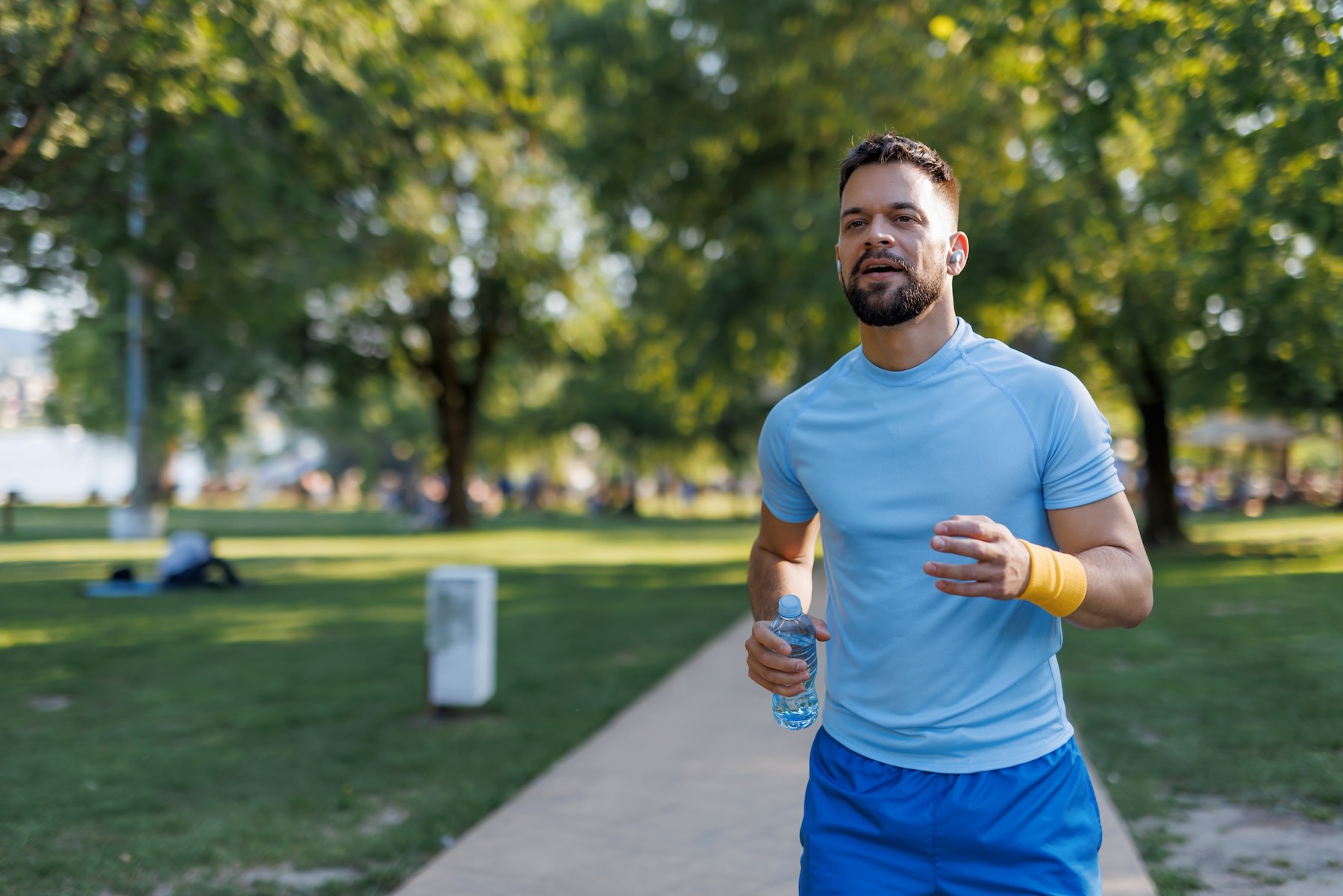
The Good Brigade / DigitalVision via Getty Images
How Working Out Boosts Memory and Cognition for the Long Run
A regular exercise habit can improve cognition both now and later in life, studies show.
By Kathleen Felton•
How Exercise Impacts Memory
Do All Types of Exercise Boost Memory?
Does Exercise Length and Frequency Have an Effect on Memory?
The Takeaway
It’s certainly no secret that exercise benefits your body. But working out is also seriously good for your brain: In addition to improving mood and lowering risk of certain mental health conditions, research has shown us that exercise can strengthen memory in a number of powerful ways.
Discover more ways to reach your goals with Peloton
“Exercise benefits memory by enhancing brain structure and function,” says Ben Singh, PhD, a postdoctoral researcher at the University of South Australia who has studied memory and exercise. “Over time, these effects can improve short-term memory, recall, and the ability to learn new information.”
Read on for more about the connection between exercise and memory, including which workouts have been shown to improve cognition and how much exercise.

Peloton App
Access thousands of classes with no equipment needed.
How Exercise Impacts Memory
There are a few different avenues exercise takes to help improve your memory. Here are a few ways your workouts may translate to stronger brain health.
It May Improve Cognition
Multiple studies have shown that exercise can boost cognition—or the way your brain learns and absorbs information—which in turn helps to strengthen memory.
Take a recent systematic review published in the British Journal of Sports Medicine (BJSM): Researchers reviewed more than 2,500 randomized controlled trials with over 250,000 participants and identified strong links between exercise and improved cognition, executive function, and memory. What’s more, these benefits weren’t limited to older adults; in fact, memory improvements were most noticeable for children and adolescents.
Similarly, a 2019 study published in Neurology found that doing regular aerobic exercise for 6 months led to impressive executive-function improvements, especially for older adults (although participants as young as 20 saw brain health benefits).
All of these brain-boosting benefits may help safeguard your mind from dementia (an umbrella term used to describe the decline of memory and thinking), which impacts an estimated 42 percent of Americans over age 55, according to the National Institutes of Health. In the 2024 update of the Lancet Commission on dementia, researchers noted that physical activity can help reduce a person’s risk of developing dementia.
It Can Boost Your Memory Shortly After Exercising…
Often, the positive effects of exercise (better cardiovascular health or stronger muscles, for example), require a little bit of time and patience to actually experience. But you can start improving your brain health within just one day of exercising, research suggests.
In a 2024 study of middle-aged and older adults, researchers found that participants who completed moderate-to-vigorous workouts performed better on memory tests the next day. On the flip side of the coin, the researchers also observed an association between increased sedentary time and lower working memory scores.
But It Delivers Long-Term Benefits Too
The benefits of exercise on brain health and memory can be long-lasting, research suggests. A 2024 study published in the journal Aging and Disease found that healthy older adults who did regular HIIT workouts for 6 months experienced improved cognition. And the benefits lasted quite some time: Researchers performed cognitive testing on participants for up to 5 years after the exercise intervention began and observed improved structural and connectivity changes in the hippocampus, the area of the brain responsible for learning and memory.
What’s more, these changes were observed even if the participants didn’t keep up with the HIIT routines on their own after the six-month intervention ended. “Even though they went back to their normal routines, which were pretty low levels of exercise, after five years when we tested them again, they retained their improvement,” says Perry Bartlett, Emeritus Professor at the Queensland Brain Institute at the University of Queensland in Australia and one of the lead researchers on the study.
This suggests that even relatively short-term bursts of exercise can make a big difference. “We’ve shown by MRI that there are changes in connectivity within the hippocampus, and this probably is long-lasting,” Bartlett says. “Once you’ve made those changes, you’ve permanently changed the connectivity between neurons in the hippocampus.”
It Allows You to Sleep Better
Finally, exercise may also improve memory indirectly by helping to improve the quality of your shut-eye. Research has consistently shown that exercise helps you fall asleep more easily and leads to higher-quality sleep throughout the night. And sleep plays an important role in memory, since our minds reinforce what we learned during the day while at rest.

RealPeopleGroup / E+ via Getty Images
Do All Types of Exercise Boost Memory?
As for the “best” type of exercise to improve memory? The answer isn’t so clear-cut: Research has shown benefits for a variety of exercise types, and more studies on the topic are needed. One challenge, Bartlett notes, is that many existing studies on exercise and memory involve self-reported questionnaires, which aren’t always the most reliable. “There’s so much variation in the literature about the effective exercise on cognition,” he says, “it’s very hard to pin down.”
Here’s what existing research has shown so far about different kinds of exercise and memory:
Aerobic exercises such as walking or jogging have been some of the most-studied workout types when it comes to memory and brain health in general. “Aerobic exercise (like brisk walking, cycling, or swimming) has the most consistent evidence for improving memory,” Singh says.
Resistance training may be particularly beneficial when it comes to combating mild cognitive impairment or dementia. A 2021 review found that while all kinds of exercise helped increase or maintain cognition, resistance workouts were most likely to slow cognitive decline in patients who had these conditions.
Balance exercises can also lead to better cognitive outcomes. “Mind–body exercises like yoga and tai chi, which combine movement with mental focus, are also effective, especially for older adults,” Singh says. In the large BJSM review that Singh worked on, researchers wrote that low-intensity workouts like these may be beneficial because they require “significant cognitive components”—in yoga, for example, you need to remember various poses and sequences, while tai chi involves memorization and spatial awareness.
Exercise video games count too! That same BJSM review actually noted that some of the largest improvements in memory were found in studies where participants played “exergames,” or video games that involve physical movement. Similar to yoga and tai chi, the researchers noted that these often require you to think while exercising, such as by problem-solving and making quick decisions during the course of the game.
As for exercise intensity? High-intensity interval exercise was found to be particularly beneficial at improving brain function in the 2024 Aging and Disease study, as mentioned above. But low- and moderate-intensity exercise has been found to be beneficial for memory too. In the BJSM review, for example, researchers observed higher improvements in memory and executive function in studies where participants performed these kinds of workouts.
Long story short? While studies show variation in the specific benefits of different types of exercise, any exercise is worth doing when it comes to the health of your brain and its ability to retain memories.
Does Exercise Length and Frequency Have an Effect on Memory?
The latest physical guidelines for Americans recommend adults aim for at least 150 minutes of moderate-intensity exercise a week, or 30 minutes a day spread over five days. And in general, it’s understood that more exercise equals greater health benefits. But research on exercise and memory suggests that any amount of physical activity is better than none at all—even a little movement offers benefits.
“The standard guideline of 150 minutes of moderate-intensity exercise per week is a great target, and achievable for most people,” Singh says. “That said, even shorter or lighter sessions can be beneficial.”
Take a recent study led by researchers at the Johns Hopkins Bloomberg School of Public Health, which found even small amounts of moderate-to-vigorous exercise—say, 35 minutes a week, or just five minutes a day—to be associated with a 41 percent lower dementia risk compared to not working out at all. Extending your workout time may offer further protective benefits, though: The researchers noted that dementia risk continued to decrease as participants exercised more. And exercising at any point in life may also help safeguard your future brain health, as the five-year Aging and Disease study suggests.
Singh’s BJSM umbrella review even found memory improvements in interventions as short as 1–3 months. “In other words, anything is better than nothing,” he says.
The Takeaway
While we still need more research on the connection between exercise and memory, it’s clear that physical activity can absolutely benefit your brain health, helping to boost cognition, lower dementia risk, and improve sleep, which can also support memory. Studies suggest that the effects on your memory can start shortly after exercise and, in some cases, be long-lasting. Different studies show varying benefits of exercising at low, moderate, and high intensities, and more research is needed. But when it comes to supporting your memory, any and all exercise is better than none.
This content is for informational and educational purposes only and does not constitute individualized advice. It is not intended to replace professional medical evaluation, diagnosis, or treatment. Seek the advice of your physician for questions you may have regarding your health or a medical condition. If you are having a medical emergency, call your physician or 911 immediately.
Get our latest health stories straight to your inbox
Enter your email to get articles, expert-backed tips, and updates from Peloton sent to your inbox.
By providing your email address, you agree to receive marketing communications from Peloton.
For more about how we use your information, see our Privacy Policy.








